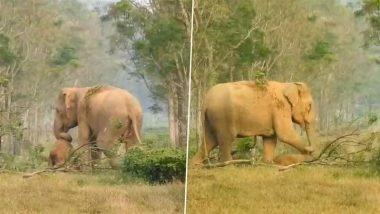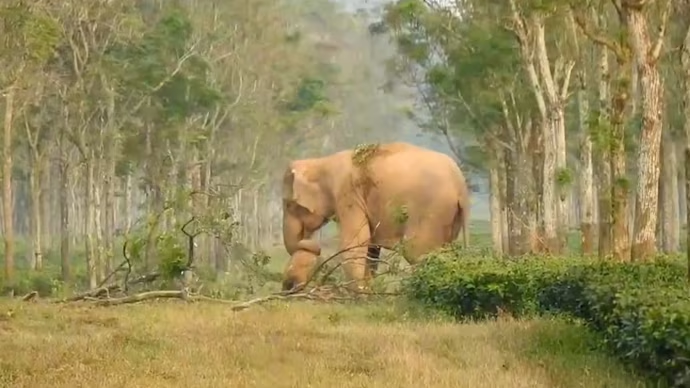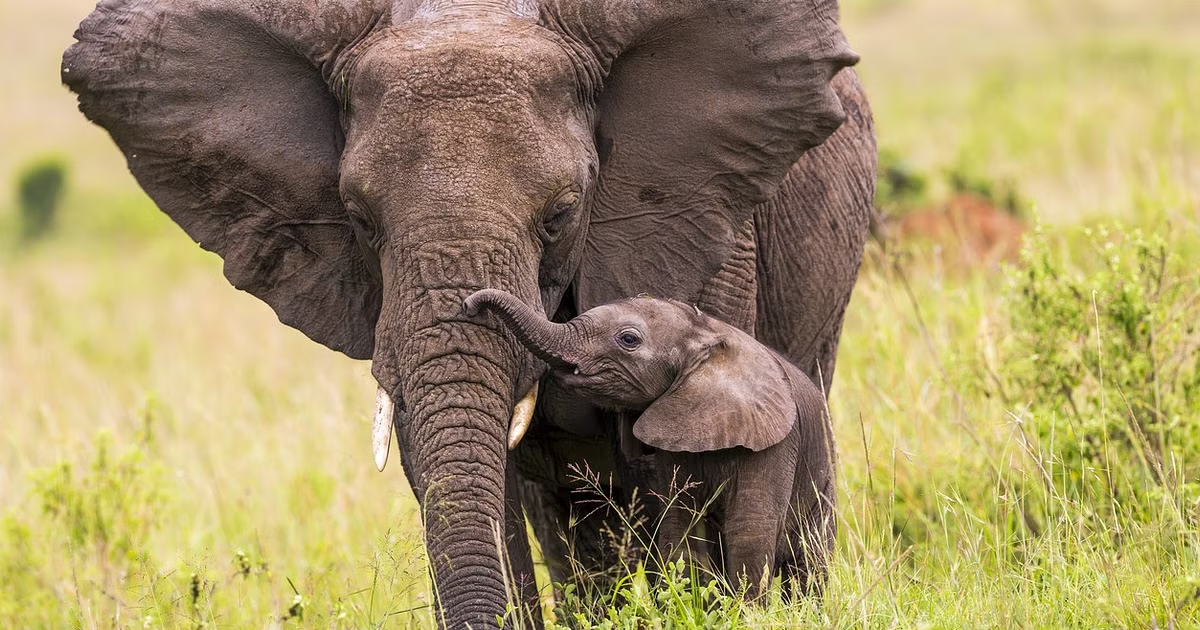A recently shared video of an Mother Elephant Dragging Body of Dead Calf has taken the internet by storm, touching hearts and evoking profound emotions.
The video, filmed by Assistant Deputy Forest Officer (ADFO) Jayanta Mondal and shared by Indian Forest Service (IFS) officer Parveen Kaswan, illustrates a raw, poignant display of maternal grief in the animal kingdom.
As this heartbreaking footage circulates across social media platforms, it has sparked widespread discussions about the emotional intelligence of elephants and the broader need for compassion and respect toward wildlife.
The Heartbreaking Scene: Mother Elephant Dragging Body of Dead Calf
In the viral video, the elephant mother can be seen gently yet persistently dragging the body of her deceased calf. This harrowing act of sorrow and denial speaks volumes about the emotional depth and intelligence of these magnificent creatures.
Witnesses noted that the mother elephant stayed beside the calf’s body for days, unable or unwilling to leave. Every movement of the grieving mother—whether pausing to nudge the lifeless body or emitting mournful sounds—reflects an instinctual and profound sorrow that transcends species barriers.
Read : Truth Behind Viral Video of Elephant Stuck on a Cliff
This incident is not an isolated one. Kaswan remarked that such scenes are observed frequently in the wild. Elephants, known for their complex social structures and deep familial bonds, often engage in behaviors resembling human mourning rituals.
Entire herds have been observed participating in what appears to be a funeral procession, staying close to the deceased, gently touching the body with their trunks, and emitting low-frequency rumbles that communicate sorrow.
#Elephant Mother not able to comprehend death of her calf. She keeps dragging body for some time – at times for days. They are so like us – they are so humane. pic.twitter.com/qmWBjLZud8
— Parveen Kaswan, IFS (@ParveenKaswan) November 21, 2024
The footage serves as a stark reminder of the emotional lives animals lead, challenging the anthropocentric notion that grief and mourning are uniquely human experiences. By sharing this video, conservationists and wildlife officials aim to foster a deeper understanding and respect for the rich emotional tapestry of life in the animal kingdom.
Elephants and Emotional Intelligence: What Science Says
Elephants are widely regarded as some of the most emotionally intelligent animals on the planet. Their cognitive abilities are well-documented, and their behavior indicates a high degree of self-awareness, empathy, and social complexity.
Scientific studies have shown that elephants exhibit a range of emotions, including joy, anger, compassion, and, as this video so painfully demonstrates, grief.
One of the most striking aspects of elephant behavior is their response to death. When an elephant dies, members of the herd often display what researchers interpret as mourning behaviors.
They will gather around the deceased, touch the body with their trunks, and sometimes cover it with leaves or branches—a behavior reminiscent of burial. These actions are not driven by simple curiosity; rather, they reflect a deep emotional bond and a complex understanding of life and death.

In some cases, elephants have been observed returning to the sites where their companions or family members died, revisiting the bones and exhibiting behaviors that suggest recognition and remembrance. This kind of memory and emotional continuity points to a level of cognitive sophistication that is both fascinating and humbling.
The viral video of the mother elephant dragging her calf’s body underscores these findings, offering a visceral, real-world example of the depth of elephant emotions.
It challenges us to reconsider our relationship with animals and recognize that their emotional lives are not so different from our own. This realization has profound implications for how we approach wildlife conservation and animal welfare.
The Impact on Humans: Reflections and Responsibilities
The video’s emotional impact on viewers around the world highlights the deep connection humans feel toward animals, especially those that display behaviors so closely aligned with our own. Social media responses have ranged from expressions of sorrow and empathy to calls for greater awareness and action in protecting elephant populations.
“There’s nothing like the love a mother has for her child,” one user commented, capturing the universal nature of maternal grief. Another user noted, “An elephant mother grieving her calf shows their emotional depth and strong bonds.
It inspires empathy but also reminds us to respect wildlife and their natural behaviors without overly humanizing them.” This sentiment underscores a crucial point: while it’s natural to draw parallels between human and animal emotions, it’s equally important to respect the unique context and needs of wildlife.

The viral nature of the video has also sparked broader conversations about the threats facing elephants today. Habitat loss, poaching, and human-elephant conflicts pose significant challenges to elephant populations worldwide.
As we witness this mother’s grief, we are reminded of the urgent need to protect these gentle giants and their habitats. Every act of conservation, every effort to reduce human impact on their ecosystems, is a step toward ensuring that future generations of elephants can live and thrive in the wild.
Moreover, the video serves as a powerful educational tool, fostering empathy and awareness among people who may otherwise be disconnected from the realities of wildlife conservation.
By sharing such moments of raw emotion, conservationists hope to bridge the gap between human experiences and the animal world, inspiring a deeper sense of responsibility and stewardship.
The viral video of the mother elephant dragging her dead calf’s body is more than just a heartbreaking moment—it is a profound reminder of the emotional complexity of animals and the deep connections they share with each other.
It challenges us to look beyond our human-centric view of the world and recognize the shared experiences of grief, love, and loss that unite all living beings.
As this poignant scene continues to resonate with people across the globe, it carries an important message: We must respect and protect the natural world, not only because of its ecological value but because of the deep, intrinsic worth of every life it contains.
The grief of an elephant mother is a powerful testament to the emotional lives of animals—a truth that demands our empathy, our respect, and our action.

